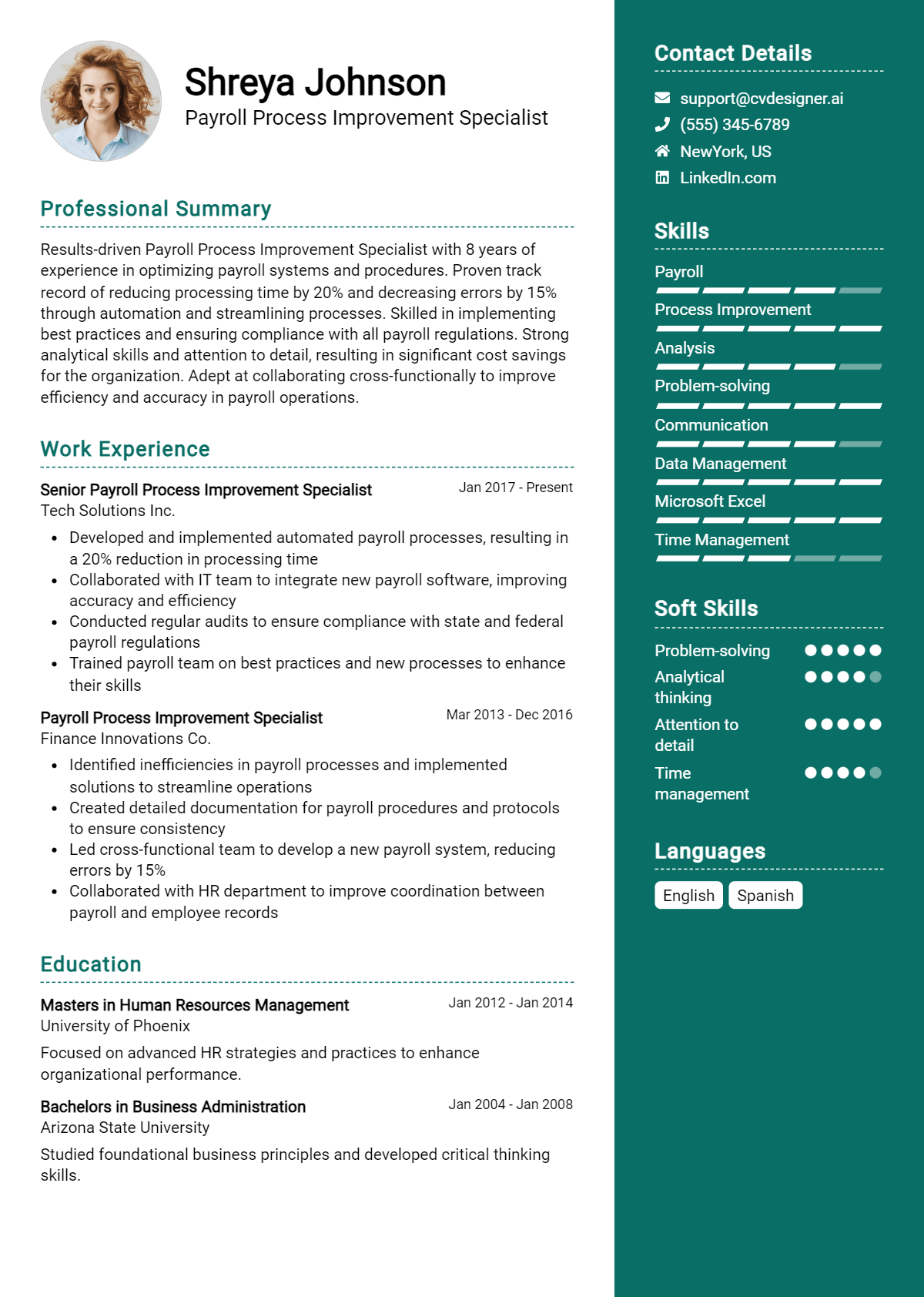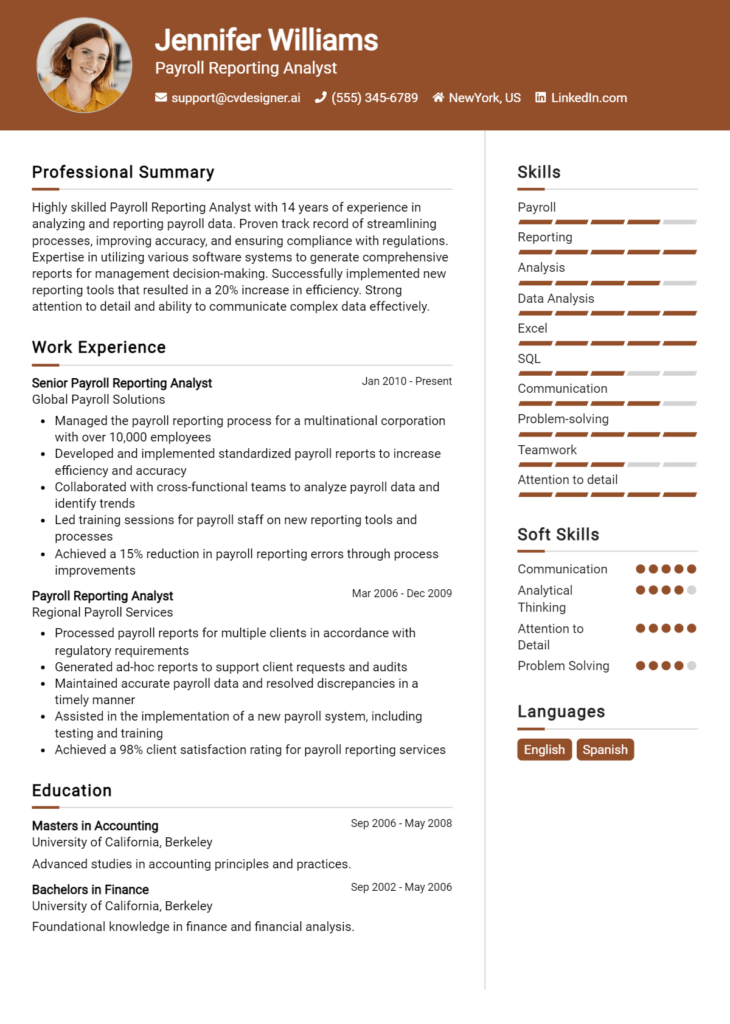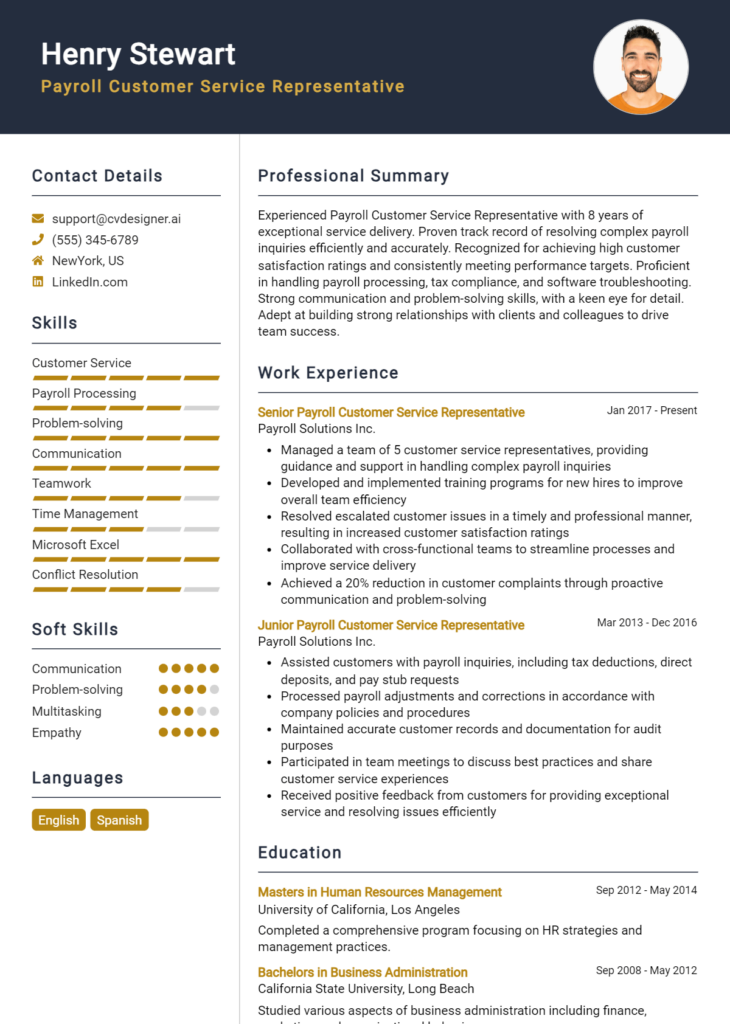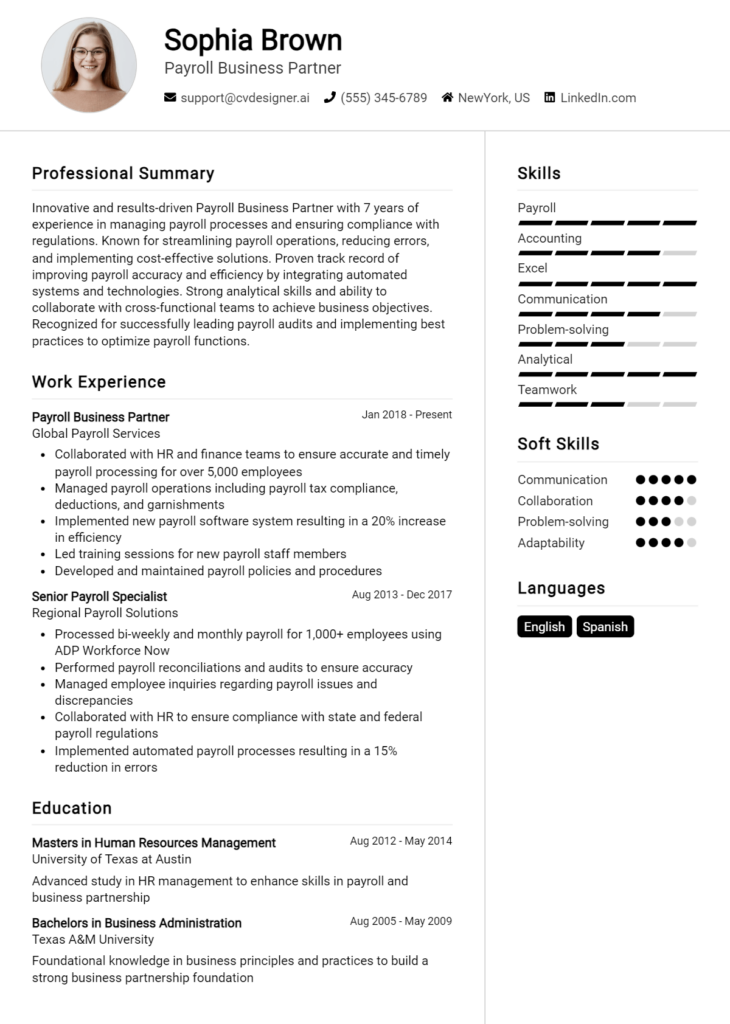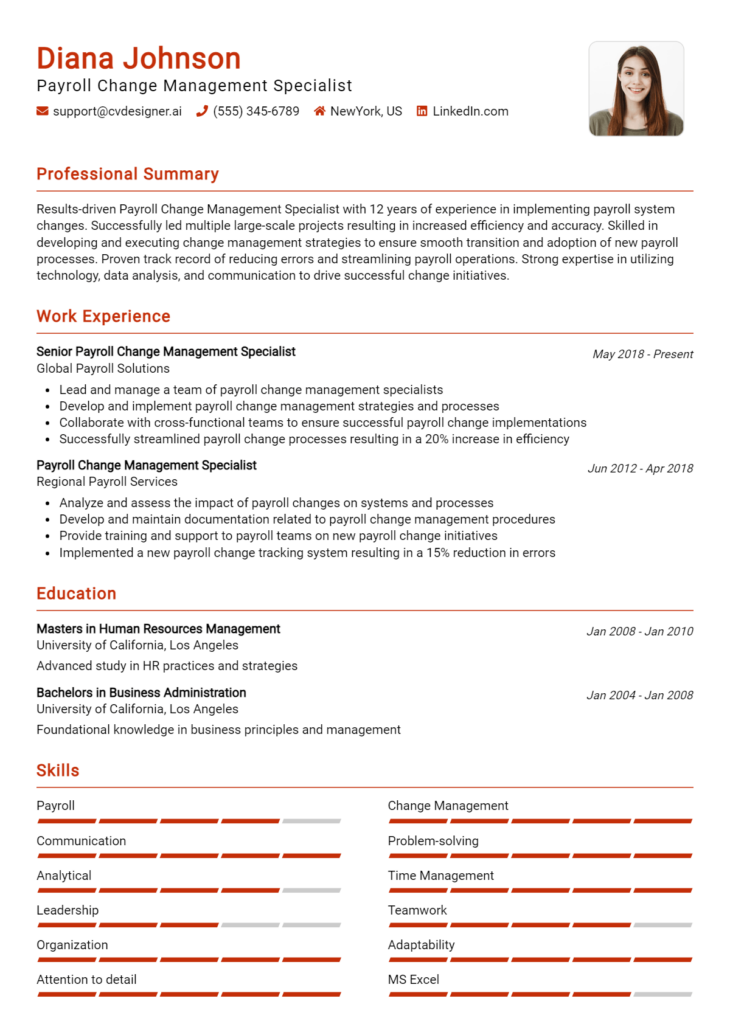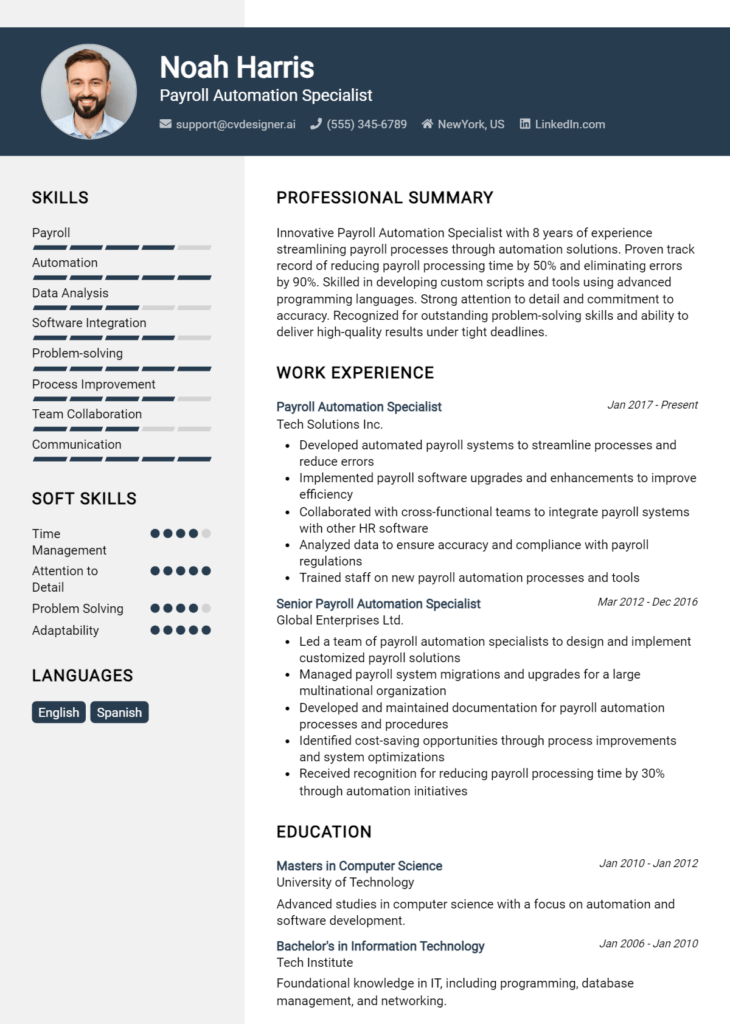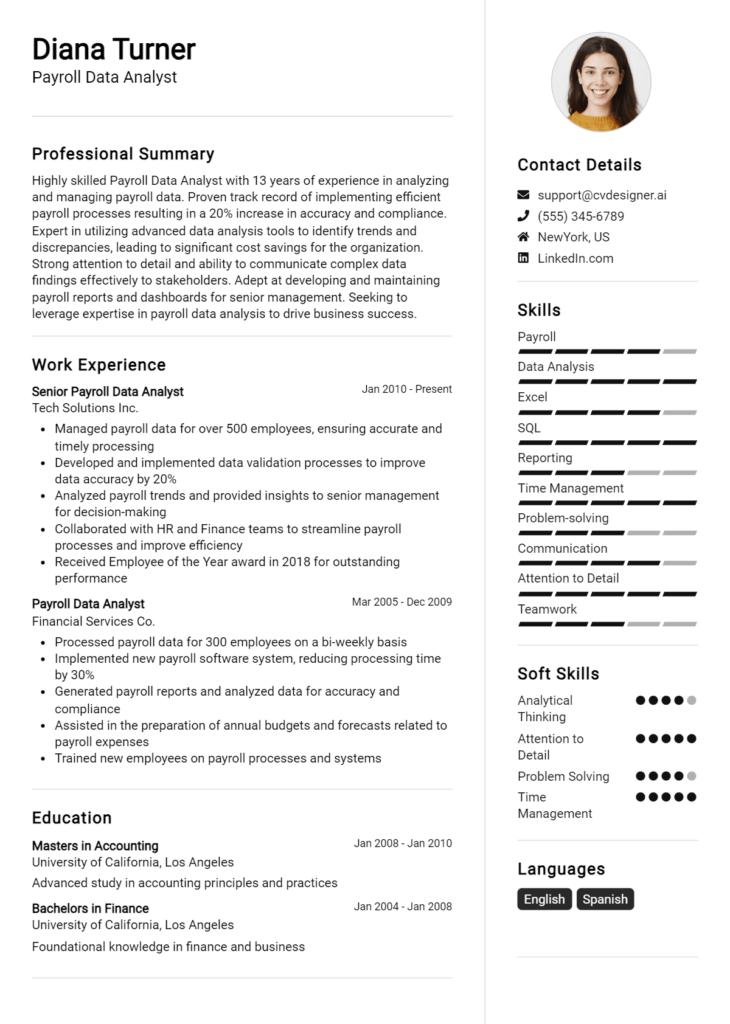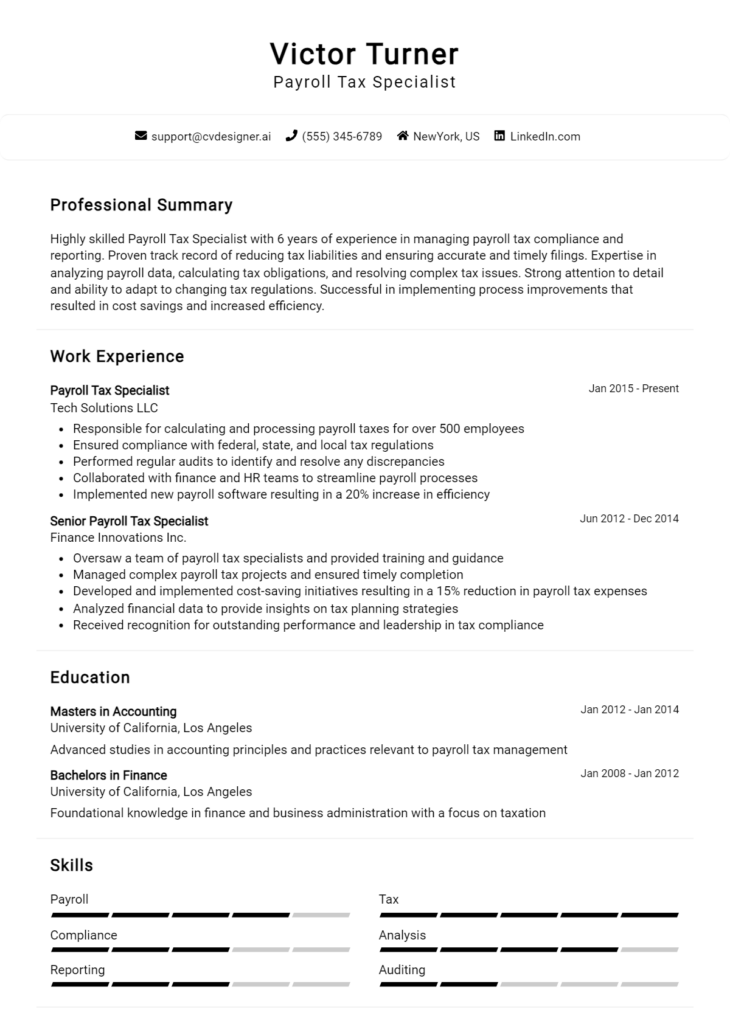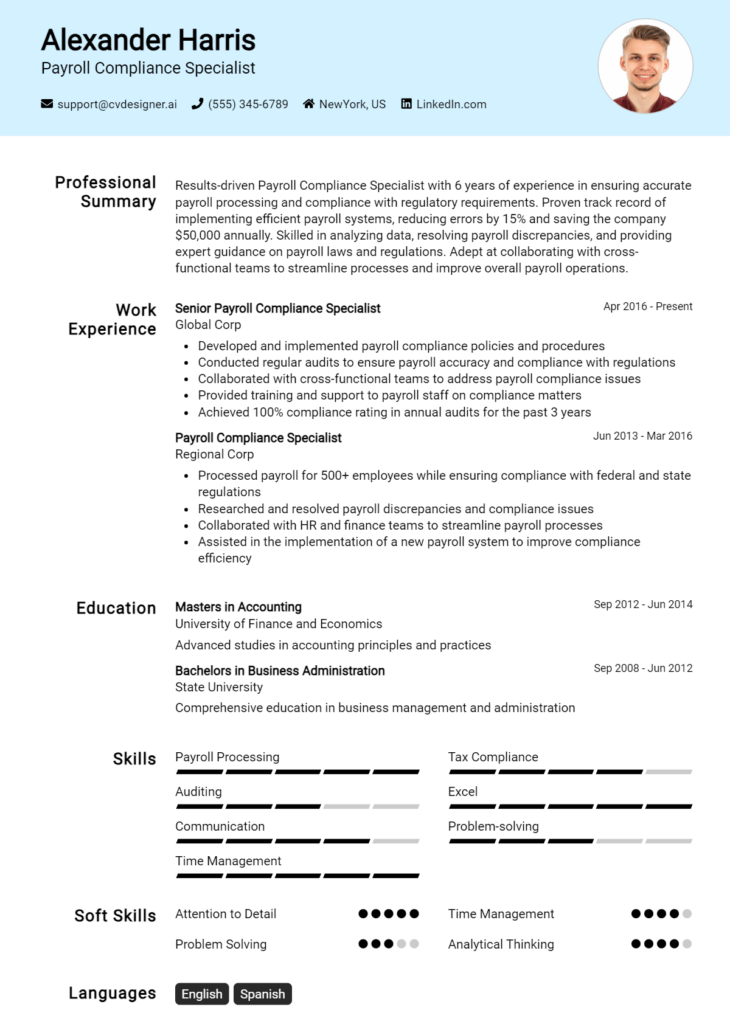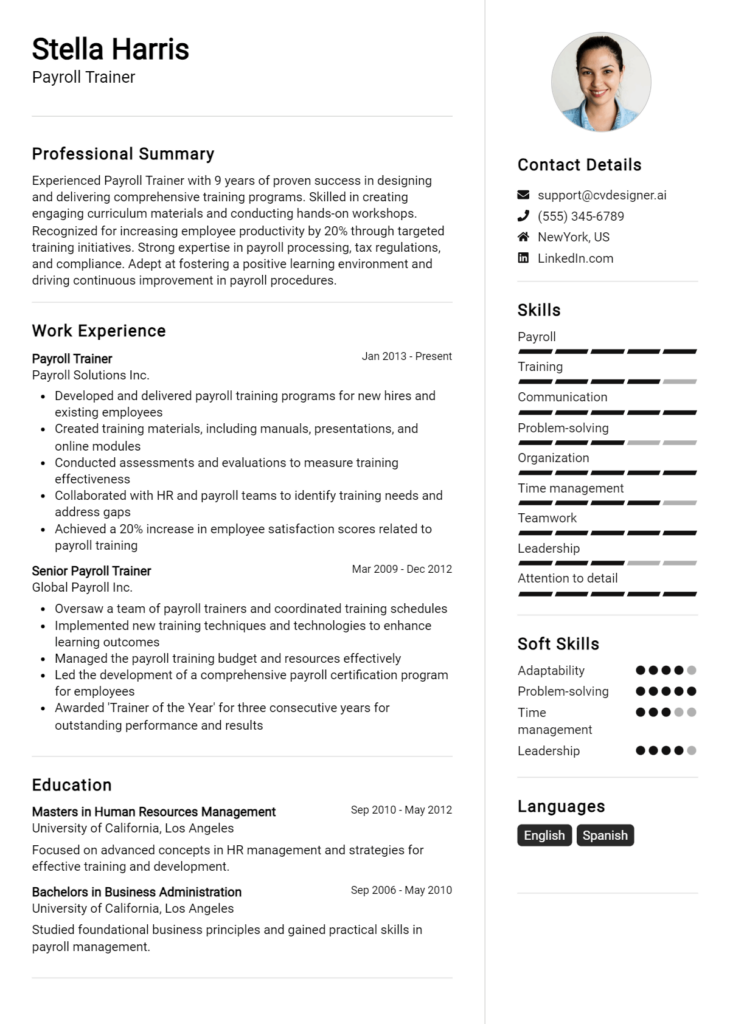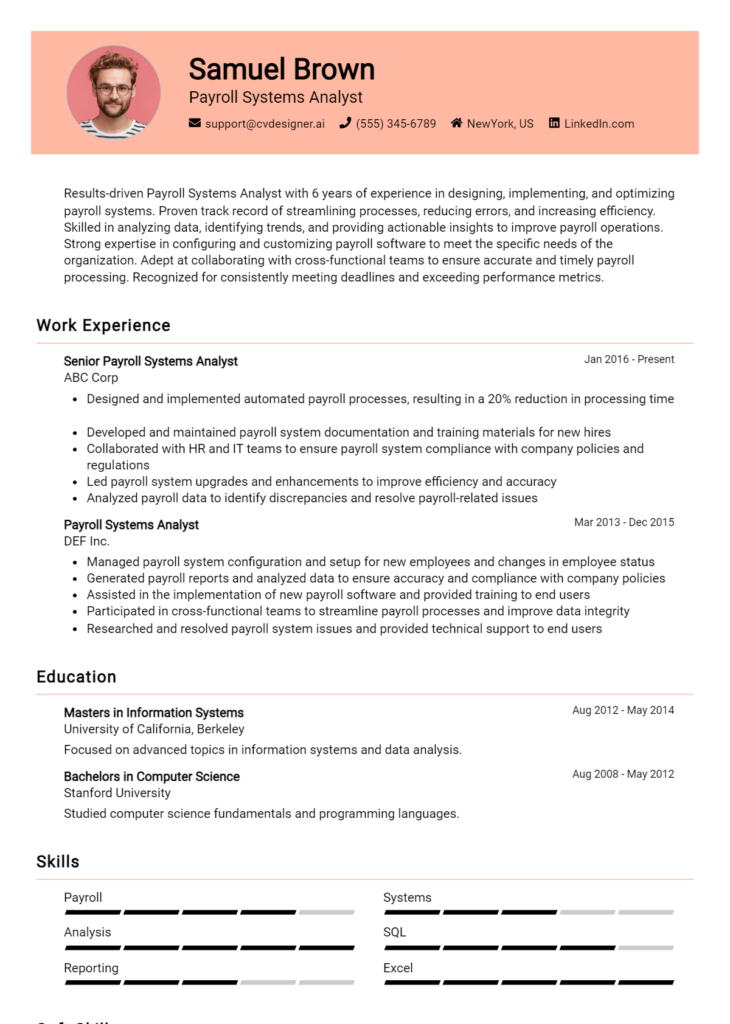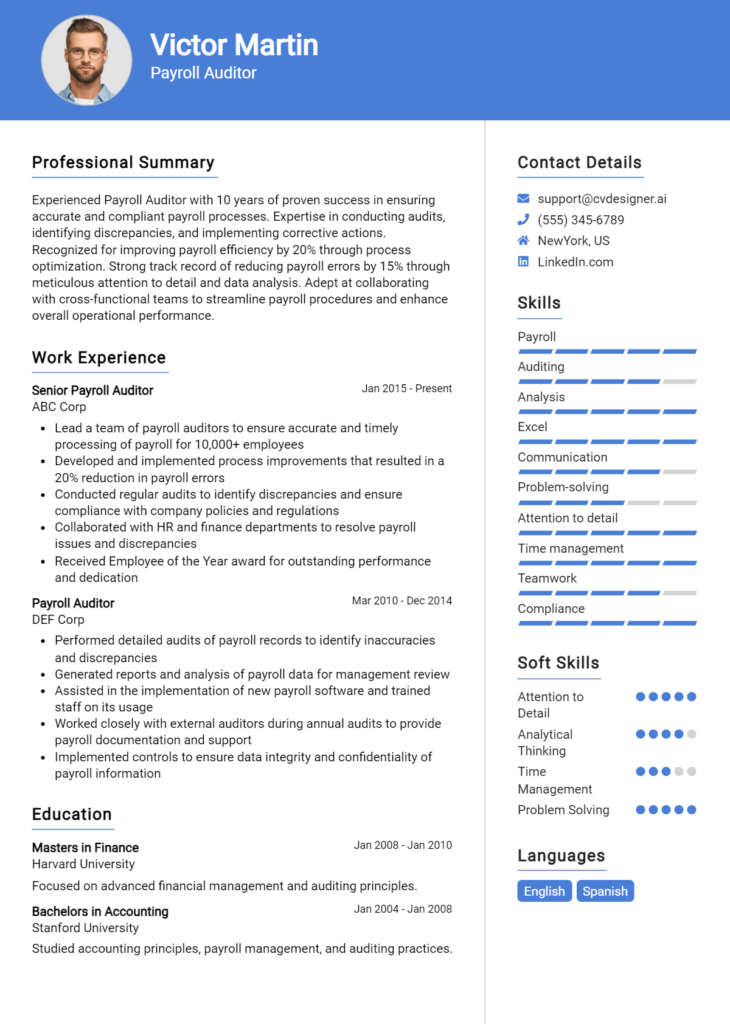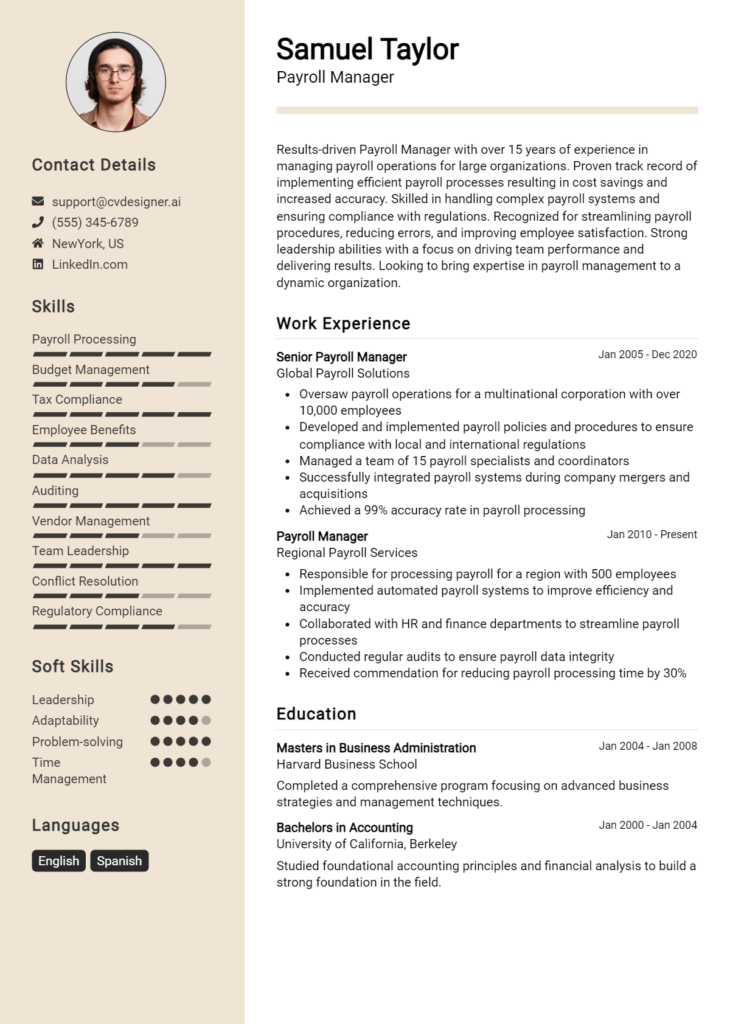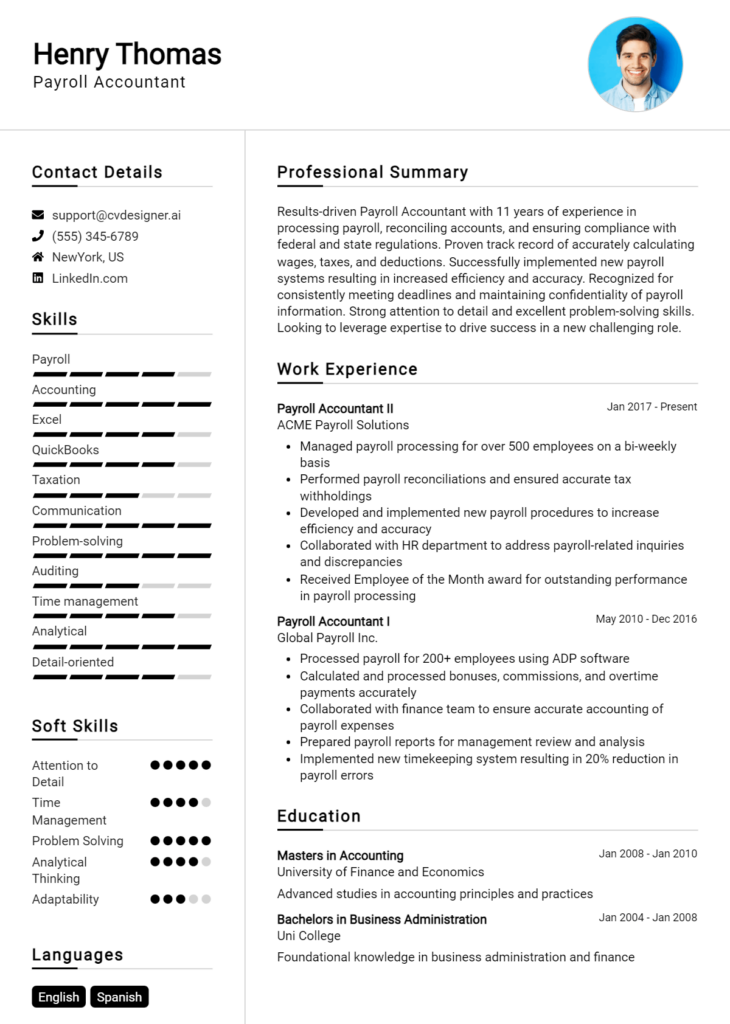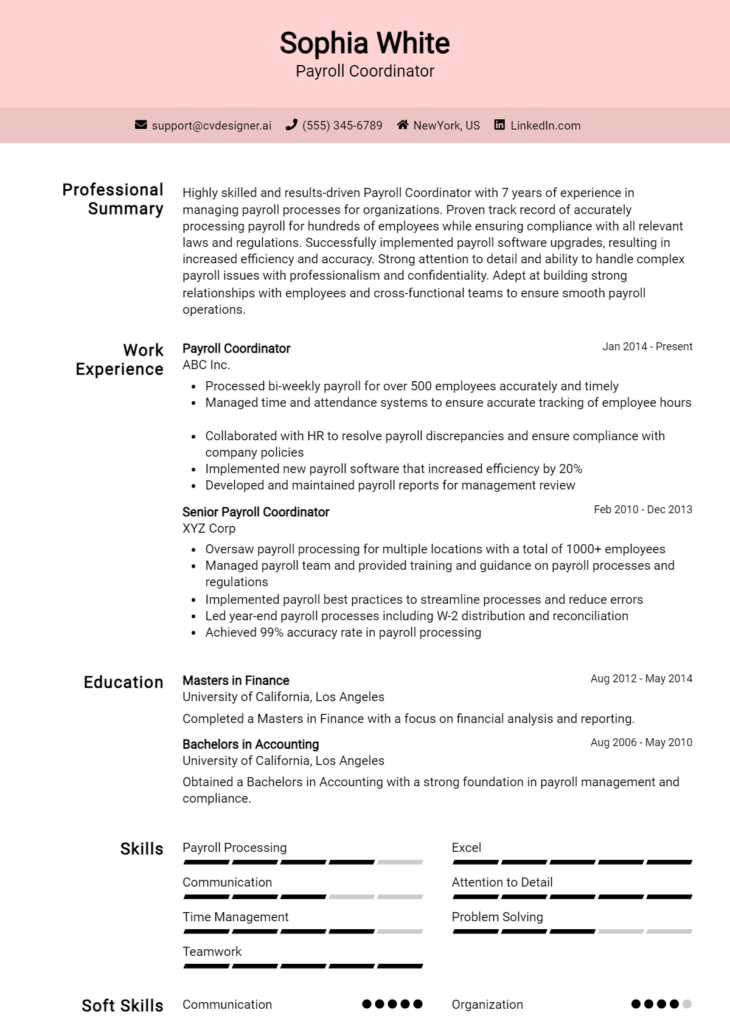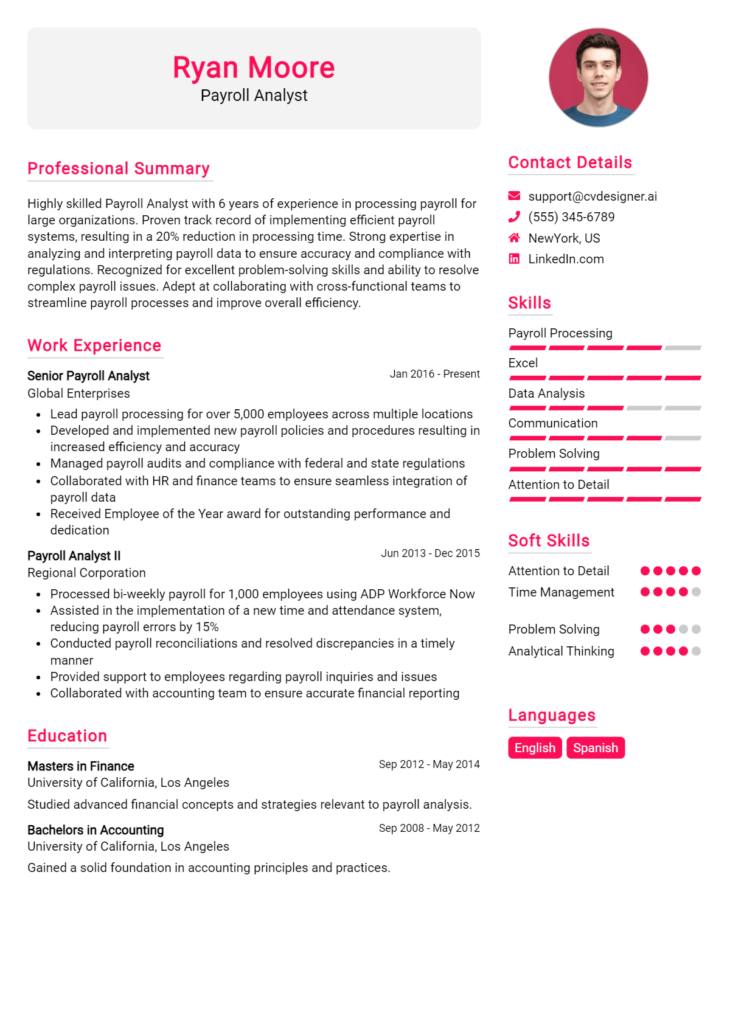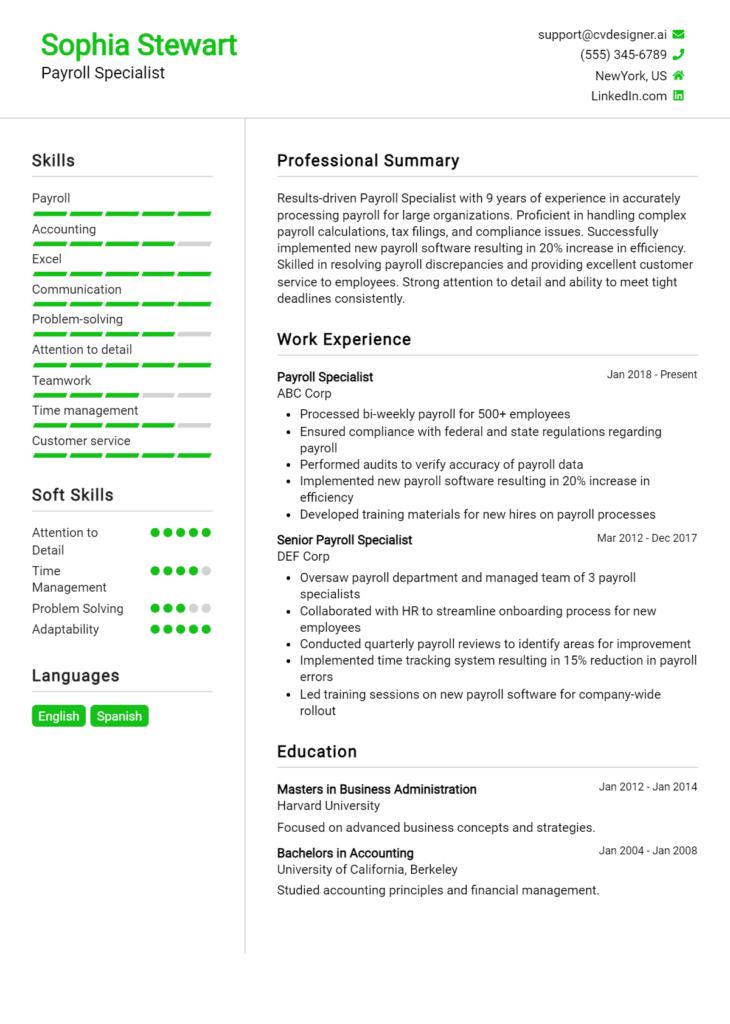Payroll Process Improvement Specialist Core Responsibilities
A Payroll Process Improvement Specialist plays a crucial role in enhancing payroll efficiency and accuracy by collaborating across departments such as HR, finance, and compliance. Key responsibilities include analyzing existing payroll processes, identifying areas for improvement, and implementing technological solutions. Essential skills encompass technical proficiency in payroll systems, operational insight, and strong problem-solving abilities. These skills are vital for achieving organizational goals, and a well-structured resume can effectively highlight these qualifications to attract potential employers.
Common Responsibilities Listed on Payroll Process Improvement Specialist Resume
- Analyze and optimize payroll processes for efficiency and accuracy.
- Collaborate with HR and finance teams to ensure alignment of payroll practices.
- Implement and maintain payroll software and technology solutions.
- Conduct regular audits of payroll data to identify discrepancies.
- Develop and deliver training for staff on payroll policies and procedures.
- Prepare reports and presentations on payroll metrics and improvements.
- Stay updated on payroll regulations and compliance requirements.
- Facilitate communication between departments to resolve payroll-related issues.
- Lead projects focused on payroll process automation and enhancements.
- Document and maintain standard operating procedures for payroll processes.
- Monitor payroll system performance and troubleshoot issues as needed.
- Support the integration of new payroll-related technologies and tools.
High-Level Resume Tips for Payroll Process Improvement Specialist Professionals
In the competitive field of payroll process improvement, a well-crafted resume serves as your first opportunity to make a lasting impression on potential employers. It is essential that your resume not only showcases your skills and achievements but also aligns closely with the specific requirements of the job you are targeting. A strong resume can set you apart from other candidates by effectively communicating your expertise in payroll processes, compliance, and optimization strategies. This guide will provide practical and actionable resume tips specifically tailored for Payroll Process Improvement Specialist professionals, ensuring that you present your qualifications in the best possible light.
Top Resume Tips for Payroll Process Improvement Specialist Professionals
- Tailor your resume to the job description by incorporating relevant keywords and phrases used in the posting.
- Highlight your experience with payroll software and systems, emphasizing your proficiency in tools commonly used in the industry.
- Showcase your achievements by quantifying results, such as cost savings or efficiency improvements, with specific metrics.
- Include a dedicated section for certifications and professional development relevant to payroll processes, such as CPP or FPC.
- Emphasize your analytical skills by detailing how you have used data to drive payroll process improvements.
- Demonstrate your understanding of compliance regulations and how you have ensured adherence in previous roles.
- Use action verbs to describe your responsibilities and accomplishments, making your contributions clear and impactful.
- Keep the format clean and professional, ensuring that your resume is easy to read and visually appealing.
- Incorporate testimonials or endorsements from previous supervisors or colleagues to add credibility to your qualifications.
- Make sure to include both soft skills, such as communication and teamwork, and hard skills that are specific to payroll processing.
By implementing these tips, you can significantly enhance your resume's effectiveness, increasing your chances of landing a job in the Payroll Process Improvement Specialist field. A well-structured and targeted resume not only highlights your qualifications but also demonstrates your commitment to excellence in payroll management, setting the stage for successful job interviews and career advancement.
Why Resume Headlines & Titles are Important for Payroll Process Improvement Specialist
The role of a Payroll Process Improvement Specialist is crucial for organizations seeking to enhance the efficiency and accuracy of their payroll systems. A well-crafted resume headline or title serves as the first impression a candidate makes on hiring managers, summarizing their key qualifications in a single, impactful phrase. A strong headline not only grabs attention but also provides a concise snapshot of the candidate’s expertise relevant to the position. By being specific and relevant, a headline can effectively communicate the value a candidate brings to the table, increasing the likelihood of securing an interview.
Best Practices for Crafting Resume Headlines for Payroll Process Improvement Specialist
- Keep it concise: Aim for a headline that is brief yet descriptive, ideally no more than 10-12 words.
- Be role-specific: Tailor your headline to reflect the specific position of Payroll Process Improvement Specialist.
- Highlight key skills: Incorporate relevant skills or qualifications that directly relate to the job.
- Use action-oriented language: Use dynamic verbs that convey initiative and expertise.
- Incorporate industry keywords: Utilize terms commonly associated with payroll and process improvement to enhance visibility.
- Avoid jargon: Use clear language that is easily understood by hiring managers across various backgrounds.
- Showcase accomplishments: If applicable, include quantifiable achievements that demonstrate your impact in past roles.
- Make it unique: Differentiate yourself by including personal branding elements that set you apart from other candidates.
Example Resume Headlines for Payroll Process Improvement Specialist
Strong Resume Headlines
"Transformational Payroll Process Improvement Specialist with 10+ Years of Experience"
“Results-Driven Payroll Analyst Focused on Streamlining Operations and Enhancing Accuracy”
“Expert in Payroll Compliance and Process Optimization with Proven Track Record”
Weak Resume Headlines
“Payroll Specialist”
“Experienced Professional Seeking Payroll Job”
Strong headlines are effective because they clearly communicate the candidate’s expertise and value proposition in a compelling way, immediately resonating with hiring managers. They use specific language and highlight relevant experience that aligns with the job requirements. Conversely, weak headlines fail to impress due to their vagueness and lack of detail, which do not convey the candidate's unique qualifications or the impact they can make in the role. By avoiding generic titles, candidates can better position themselves as standout applicants in a competitive job market.
Writing an Exceptional Payroll Process Improvement Specialist Resume Summary
A well-crafted resume summary is crucial for a Payroll Process Improvement Specialist, as it serves as the first impression for hiring managers. This brief introduction should effectively encapsulate the candidate's key skills, relevant experience, and notable accomplishments in the realm of payroll process enhancement. A strong summary can quickly capture the attention of hiring managers by showcasing how the candidate's background aligns with the specific needs of the role. It should be concise, impactful, and tailored to the job description, ensuring that it highlights the candidate's qualifications and sets the stage for the rest of the resume.
Best Practices for Writing a Payroll Process Improvement Specialist Resume Summary
- Quantify Achievements: Use numbers and metrics to demonstrate the impact of your work.
- Focus on Skills: Highlight key skills relevant to payroll process improvement, such as data analysis, compliance, and system optimization.
- Tailor to the Job Description: Customize your summary to reflect the specific requirements and preferences outlined in the job posting.
- Be Concise: Keep your summary to 2-4 sentences to ensure clarity and ease of reading.
- Use Action Verbs: Start sentences with strong action verbs to convey a sense of initiative and accomplishment.
- Include Relevant Certifications: Mention any payroll or HR certifications that enhance your credibility.
- Showcase Problem-Solving Skills: Highlight your ability to identify inefficiencies and implement effective solutions.
- Reflect Industry Knowledge: Demonstrate familiarity with industry trends and regulations that impact payroll processes.
Example Payroll Process Improvement Specialist Resume Summaries
Strong Resume Summaries
Results-driven Payroll Process Improvement Specialist with over 5 years of experience streamlining payroll operations, achieving a 25% reduction in processing time and a 15% increase in compliance accuracy. Proficient in utilizing advanced payroll software and data analytics to enhance operational efficiency.
Detail-oriented Payroll Specialist with expertise in process optimization, recognized for implementing a new payroll system that decreased errors by 30% and improved employee satisfaction ratings by 40%. Holds a Certified Payroll Professional (CPP) designation.
Skilled Payroll Process Improvement Specialist with a track record of transforming payroll operations in a multi-state environment. Successfully managed a project that automated payroll processing, leading to a 20% reduction in labor costs and a 95% accuracy rate.
Innovative Payroll Specialist with a focus on continuous improvement, having led initiatives that enhanced payroll processing workflows, resulting in a 50% decrease in processing time and a 10% increase in team productivity. Adept at training staff on new systems and compliance standards.
Weak Resume Summaries
Experienced payroll professional looking for new opportunities to improve payroll processes.
Payroll Process Improvement Specialist with various skills and experiences in the field.
The strong resume summaries are considered effective because they provide specific, quantifiable achievements and clearly demonstrate how the candidate's skills align with the needs of the role. They use metrics to illustrate the positive impact of their work and include relevant certifications, making them stand out to hiring managers. In contrast, the weak summaries lack detail and specificity, making them too generic and less impactful, failing to engage the reader or highlight unique qualifications.
Work Experience Section for Payroll Process Improvement Specialist Resume
The work experience section is a critical component of a Payroll Process Improvement Specialist resume, as it serves as a showcase for the candidate's technical skills, team management capabilities, and the ability to deliver high-quality products. This section not only highlights relevant professional experiences but also illustrates how the candidate has effectively implemented payroll process improvements, ensuring compliance and efficiency. By quantifying achievements and aligning experiences with industry standards, candidates can demonstrate their value to potential employers and their readiness to tackle the complexities of payroll management.
Best Practices for Payroll Process Improvement Specialist Work Experience
- Highlight specific technical skills relevant to payroll systems and software.
- Quantify achievements with metrics, such as percentage improvements in processing time or cost reductions.
- Demonstrate leadership by detailing team management experiences and outcomes.
- Showcase collaboration with cross-functional teams to emphasize teamwork and communication skills.
- Include certifications or training that enhance your qualifications in payroll management.
- Align your experiences with industry standards and best practices to illustrate your knowledge of the field.
- Use action verbs to describe your role in projects and initiatives.
- Focus on results-driven accomplishments that emphasize your impact on the organization.
Example Work Experiences for Payroll Process Improvement Specialist
Strong Experiences
- Led a payroll system overhaul that reduced processing time by 30%, resulting in a savings of $100,000 annually.
- Collaborated with IT and finance teams to implement a new payroll software, increasing accuracy rates by 25%.
- Managed a team of five in a payroll audit project that identified discrepancies and improved compliance, leading to a 15% reduction in errors.
- Trained staff on new payroll procedures, enhancing productivity and reducing training time by 20%.
Weak Experiences
- Assisted with payroll tasks as needed.
- Worked on various projects without specific outcomes mentioned.
- Participated in team meetings regarding payroll issues.
- Helped implement new software, but did not specify the impact.
The examples provided highlight the distinction between strong and weak experiences. Strong experiences demonstrate clear, quantifiable outcomes and technical leadership, showcasing not only what the candidate did but also the measurable impact of their contributions. In contrast, weak experiences lack specific details and quantifiable results, making them less compelling and failing to illustrate the candidate’s true capabilities in process improvement and payroll management.
Education and Certifications Section for Payroll Process Improvement Specialist Resume
The education and certifications section of a Payroll Process Improvement Specialist resume is crucial in establishing the candidate's academic foundation and professional credentials. This section serves to highlight relevant degrees, industry-recognized certifications, and ongoing learning efforts, demonstrating the candidate's commitment to mastering the complexities of payroll processes. By providing pertinent coursework and special training, candidates can significantly enhance their credibility and showcase their alignment with the requirements of the job role, ultimately making a compelling case for their suitability for the position.
Best Practices for Payroll Process Improvement Specialist Education and Certifications
- Prioritize relevant education, such as degrees in finance, accounting, or human resources.
- Include industry-recognized certifications such as Certified Payroll Professional (CPP) or Certified Human Resources Professional (CHRP).
- Detail relevant coursework that directly relates to payroll systems, process improvement, and compliance regulations.
- Highlight any specialized training in payroll software or process optimization techniques.
- Keep the information up-to-date, ensuring recent coursework or certifications are included.
- Organize the section clearly, using bullet points for easy readability.
- Consider including professional development courses or workshops to demonstrate a commitment to continuous learning.
- Tailor the education and certifications listed to align closely with the specific job requirements of the position being applied for.
Example Education and Certifications for Payroll Process Improvement Specialist
Strong Examples
- Bachelor of Science in Accounting, University of XYZ, 2020
- Certified Payroll Professional (CPP), American Payroll Association, 2021
- Advanced Payroll Management Course, XYZ Training Institute, 2022
- Master's Certificate in Project Management, ABC College, 2023
Weak Examples
- Associate Degree in General Studies, Community College, 2019
- Certification in Basic Computer Skills, Online Course, 2020
- High School Diploma, Local High School, 2018
- Outdated certification in Payroll Software from a defunct organization, 2017
The examples listed as strong demonstrate a clear relevance to the role of a Payroll Process Improvement Specialist, showcasing degrees and certifications that align with industry standards and expectations. They reflect an applicant's commitment to ongoing education and specialization within the payroll field. Conversely, the weak examples lack relevance to the position, featuring outdated or general qualifications that do not support the candidate's ability to excel in payroll process improvement, ultimately diminishing their credibility in the eyes of potential employers.
Top Skills & Keywords for Payroll Process Improvement Specialist Resume
A well-crafted resume for a Payroll Process Improvement Specialist is vital in showcasing the unique blend of skills that can drive efficiency and accuracy in payroll operations. The right skills not only highlight your expertise but also demonstrate your ability to identify gaps, streamline processes, and enhance overall payroll functionality. As organizations increasingly prioritize operational excellence, highlighting relevant skills becomes crucial in setting yourself apart in a competitive job market. This blend of hard and soft skills is essential for effectively managing payroll systems, ensuring compliance, and facilitating communication across departments.
Top Hard & Soft Skills for Payroll Process Improvement Specialist
Soft Skills
- Analytical Thinking
- Problem Solving
- Attention to Detail
- Communication Skills
- Team Collaboration
- Adaptability
- Time Management
- Conflict Resolution
- Interpersonal Skills
- Critical Thinking
Hard Skills
- Payroll Software Proficiency (e.g., ADP, Paychex)
- Data Analysis and Reporting
- Knowledge of Labor Laws and Regulations
- Process Mapping and Improvement Techniques
- ERP Software Experience
- Excel and Spreadsheet Management
- Project Management
- Compliance Auditing
- Statistical Analysis
- Business Process Reengineering
By integrating these skills into your resume, along with highlighting your work experience, you can effectively convey your capability to enhance payroll processes and contribute to the overall success of your organization.
Stand Out with a Winning Payroll Process Improvement Specialist Cover Letter
Dear [Hiring Manager's Name],
I am writing to express my interest in the Payroll Process Improvement Specialist position at [Company Name]. With a strong background in payroll management and a proven track record of optimizing processes, I am excited about the opportunity to contribute to your team. My experience in analyzing payroll systems, identifying inefficiencies, and implementing effective solutions aligns perfectly with the goals of your organization.
In my previous role at [Previous Company Name], I led a project that streamlined the payroll processing timeline by 30%, which not only improved accuracy but also enhanced employee satisfaction. By leveraging data analytics and collaborating with cross-functional teams, I was able to identify bottlenecks and develop new workflows that reduced manual intervention. I am adept at utilizing various payroll software and tools, ensuring compliance with regulations while fostering a culture of continuous improvement.
I am particularly drawn to [Company Name] because of its commitment to innovation and excellence in payroll processing. I am eager to bring my expertise in process mapping and change management to your organization, helping to enhance operational efficiency and drive measurable results. I am confident that my proactive approach and dedication to optimizing payroll processes will make a positive impact on your team.
Thank you for considering my application. I look forward to the opportunity to discuss how my skills and experiences align with the needs of [Company Name]. I am excited about the possibility of contributing to your organization and am eager to bring my passion for process improvement to your payroll operations.
Sincerely,
[Your Name]
[Your Contact Information]
[Your LinkedIn Profile] (if applicable)
Common Mistakes to Avoid in a Payroll Process Improvement Specialist Resume
When crafting a resume for the role of a Payroll Process Improvement Specialist, it's crucial to present your skills and experiences clearly and effectively. Many candidates inadvertently make mistakes that can undermine their chances of landing an interview. By recognizing and avoiding these common pitfalls, you can create a compelling resume that highlights your qualifications for this specialized role.
Neglecting Relevant Keywords: Failing to include industry-specific keywords can result in your resume being overlooked by Applicant Tracking Systems (ATS) that many companies use to filter candidates.
Overloading with Technical Jargon: While it's important to demonstrate your expertise, using excessive jargon can make your resume difficult to read. Aim for clarity and ensure that your accomplishments are easily understood.
Ignoring Quantifiable Achievements: Listing responsibilities without quantifying your achievements can make your impact seem minimal. Use metrics to showcase improvements, such as percentage reductions in payroll errors or time saved in processing.
Lack of Tailoring: Sending out a generic resume to multiple employers can be detrimental. Tailor your resume to each job description, emphasizing the skills and experiences that align closely with the specific role.
Inconsistent Formatting: A resume that lacks a consistent format can be visually unappealing and difficult to navigate. Ensure uniformity in font, headings, and bullet points to create a professional appearance.
Omitting Soft Skills: While technical skills are essential, overlooking soft skills such as communication, problem-solving, and teamwork can be a mistake. Employers value candidates who can collaborate effectively and handle interpersonal challenges.
Excessive Length: A lengthy resume can deter hiring managers from engaging with your application. Strive to keep your resume concise, ideally one page, unless you have extensive relevant experience that warrants additional length.
Skipping the Summary Statement: Failing to include a summary or objective statement can result in a lack of direction in your resume. A well-crafted summary can provide a snapshot of your qualifications and career goals, setting the tone for the rest of your document.
Conclusion
As a Payroll Process Improvement Specialist, your role is crucial in enhancing efficiency and accuracy within payroll systems. Key responsibilities include identifying areas for improvement, implementing new technologies, and ensuring compliance with regulations. Understanding payroll software, data analysis, and effective communication are essential skills that can greatly contribute to your success in this position.
To stand out in this competitive field, it's vital to present a strong resume that highlights your expertise and achievements. Take the time to review and refine your resume to ensure it effectively showcases your qualifications. Utilize available resources like resume templates, which can provide a professional layout, or leverage a resume builder for an easy, guided experience in creating a customized document.
Additionally, examining resume examples can offer inspiration and insight into how to format your experience and skills effectively. Don't forget the importance of a compelling introduction—consider using cover letter templates to craft a strong narrative that complements your resume.
Take action now to enhance your professional profile and ensure you make a lasting impression in your job applications!

